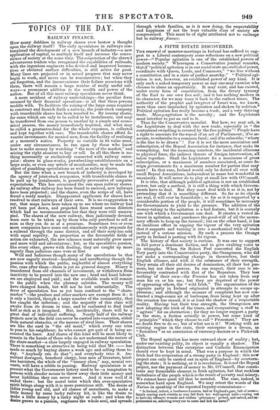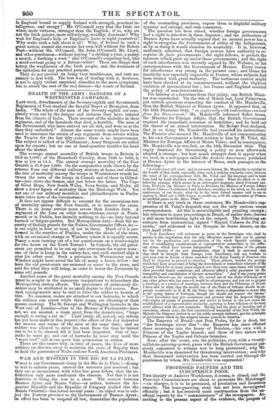A FIFTH ESTATE DISCOVERED.
THE renewal of monster-meetings in Ireland has sufficed to sug- gest to a Liberal contempory some reflections on a new political power—" Popular agitation is one of the established powers of modern society." Whereupon a Conservative journal remarks, that if "political agitation is in our social state an established power, coordinate with Queen, Lords, and Commons," "we live without a constitution and in a state of perfect anarchy." " Political agi- tation is not, however, an established power of any kind. It is only such a naked temporary power as any one may exercise who chooses to abuse an opportunity. It may exist, and has existed, under every form of constitution, from the dreary tyranny of the East to our own free soil ; and it has nothing modern in its character, for we may trace it back to the earliest times. The authority of the prophet and lawgiver of Israel was, we know, more than once impeached by agitation and shaken by sedition." Political agitation has really become a trade, and a very thriving trade. Money-agitation is the novelty ; and the Legislature must interfere to put an end to it. Thus far the Conservative moralist. But how, we may ask, is the Legislature to deal with the new trade, especially as " the contraband swindling is covered by the free politics "? People have a right to associate for the repeal of an act of Parliament ; if to as- sociate, to subscribe to a common fund ; and if to subscribe, "where is the line to be drawn" ? For it is not the mere association and subscription, of the Repeal Association for instance, that make its wrongdoing, but the menacing numbers, the incidental allusions to physical force, the indirect threats of foreign intervention, all taken together. Shall the Legislature fix a maximum of gross subscription, or a maximum of numbers associated, as some fo- reign governments fix a maximum number for parties that may meet In that case, Ireland would only be dotted all over with small Repeal Associations, independent in name but wonderful in unanimity. It will never do to play at small law with O'Connell. It is true, that although political agitation is not an established power, but only a method, it is still a thing with which Govern- ments have to deal. But they must deal with it as it is, not by pretending that it is something different. So far as its objects are real, it will ever be formidable ; so far as it is supported by a considerable portion of the people, it will sometimes be necessary for Governments to yield to the pressure. The addition of the money-taking to the agitation is a bad feature, but it is scarcely one with which a Government can deal. It creates a vested in- terest in agitation, and purchases the good-will of all the merce- nary officers to keep up the turmoil ; but on the other hand, it has an insidious effect in sapping the vigour of the very agitation that it supports and turning it into a mechanical trick of trade instead of a serious mission. By such a process the Orange party in Ireland is parting with its vigour. The history of that society is curious. It was one to support in full power a dominant faction, and to give exulting voice to its triumphs. When Sir Robert Peel converted the English Tory party into the Conservative party, the Orangemen, who did. not make a corresponding change in themselves, lost their English alliance, and with it the substance of their strength. They retain all their old desires of domination, all their hot pas- sions, but not their powers. In one respect, their case is un- favourably contrasted with that of the Repealers. They lose nothing of their own—the Premier has not taken from any man his ox or his ass ; but they are deprived of the power of oppressing others, the " wild Irish." The organization of the opposite party in Ireland originated in attempts to escape op-. pression ; and although the manner of complaint has now con- tracted a tragi-comic air of burlesque, from being kept up after the occasion has ceased, it is at least the shadow of a respectable reality. Having lost their true strength, the Orangemen are now adopting the trick of the times, and reorganizing a staff to " agitate" for an abstraction ; for they no longer support a party in the state, a faction actually in power, but some kind of "principles" which they choose to call " Protestant." They are no doubt free to do so ; but of what use is it? Working with no existing engine in the state, their enterprise is a dream, as 0°fusionless " as an association of currency-doctors or a Pickwick Club.
The Repeal agitation has more outward show of reality ; but, under our existing polity, its object is equally a shadow. The distinction between this enterprise and Catholic Emancipation should ever be kept in mind. That was a purpose in which the Irish had the cooperation of a strong party in England : this new project can only be carried out in spite of England—by overturn- ing the state ; it is nothing, or it is revolution. It is not the Repeal project, nor the payment of money to Mr. O'Connell, that consti- tutes any formidable element in Irish agitation, but that reckless turbulence of the people which is the result of poverty and misery. We cannot have quiet till that be mended. The case, indeed, is somewhat hard upon England. We may retort the words of the Nation in speaking of the repeated Inquiry-commissions- " Is Ireland, indeed, a loathsome Lazarus, laid at England's gate, full of sores— faintly craving such crumbs as may fall from her well-spread tabl ing out to have his offensive wounds and endless 'grievances' probed, and sale iuid ex- perimented on, soliciting every cur to come and lick his sores?"
Is England bound to supply Ireland with strength, practical in- telligence, and energy ? Mr. O'Connell says that the Irish are Wiser, more virtuous, stronger than the English : if so, why are not the Irish quieter, more self-relying, wealthy, dominant? Why wait for England's help or England's leave to right yourselves? Why make such a talk about it all? Why, if Ireland be such a great nation, cannot she execute her own will without Sir Robert Peel—without Mr. O'Connell, Mr. John O'Connell, Mr. Lloyd, Mid other gentlemen—without paying " a shilling a year, a penny a month, a farthing a week" into O'Connell's conjuring-box, like a maid-servant going to a fortune-teller? These are things that betray the weaknesses of the Irish people, and the weakness of the agitation for any practical purpose.
They do not prevent its being very troublesome, and very ne- cessary to deal with. The best way of dealing with it, however, is not to apply violent empirical remedies to the mere symptoms, but to attack the seat of the real disease—the wants of Ireland.



























 Previous page
Previous page